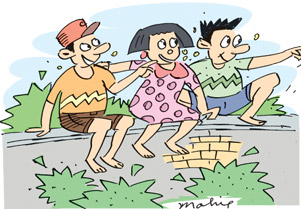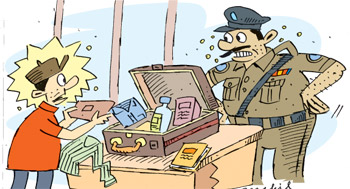|

by R. S. Karunaratne
Know how to use 'to'
The simple word 'to' has many uses in speech and writing.
1. 'To' is used to express your willingness to do a future action.
Geoff agreed to pay compensation to the workers.
My parents have decided to move into a rural area.
|

We sat on the parapet wall to watch
the elephants. |
I promised to help him in his studies.
Narmada hopes to become a doctor.
Do you want to swim this morning?
They refused to welcome the new manager.
I intend to follow a course in Astrology.
2. 'To' is used to talk about attempting, succeeding, or failing to
achieve something.
Try to pass the exam atleast this time.
The police failed to arrest the suspects.
She managed to answer the question paper.
Remember to return my book.
3. 'To' is used to express lack of certainty about a situation.
The door seems to be open.
Students tend to arrive late on rainy days.
You appear to be in a bad mood!
Today happens to be my birthday.
4. 'To' is used to talk about getting others to do certain things.
The policeman ordered me to empty my suitcase.
Father advised me not to return home late.
The teacher wants us to remain silent.
Can you help me to raise this box.
Don't force me to follow this course.
5. 'To' is used to talk about knowing and learning things.
|

The policeman ordered me
to empty my suitcase. |
I don't know where to go this weekend.
Do you remember what to bring?
Can you explain this to me?
Try to understand my situation.
Don't forget to bring your National Identity Card.
6. 'To' is used to talk about telling or showing someone something.
Can you tell me where to get off, please?
He did not teach me how to swim.
The officer advised me to renew my passport.
7. 'To' is used to say what the purpose of an action is.
We sat on the parapet wall to watch the elephants.
He stopped the car to let me get off.
8. 'To' is used with certain abstract nouns.
You have my permission to go home early.
We have a duty to elect our own representatives.
9. 'To' is used to describe how you feel about a situation.
I'm sorry to hear you're leaving.
some children are afraid to swim.
You're unlikely to succeed this time.
We are unable to meet the principal.
It's difficult to please everybody.
Some students find it easy to learn English.
We were glad to meet our grandmother.
She is ready to help anyone in trouble.
Are you willing to invest Rs. 100,000 in this project?
Set phrases
We attend school in order to learn.
(expressing purpose)
I think you should find a new job, to be honest.
To tell you the truth, I'm not happy here.
You're not old enough to vote.
I'm too old to apply for this post.
You're too young to understand my situation.
More on 'to' next week.

Electricwords is one way to increase your vocabulary. Just indicate
the correct answer and check with the key.
1. One species of lizard evolved into snakes.
(a) collided
(b) developed
(c) merged
2. Some people become unpopular because of their disposition.
(a) memory
(b) heritage
(c) temperament
3. The child tried to assemble the different pieces of the jigsaw
puzzle.
(a) join
(b) find
(c) design
4. A General cannot be too cautious in battle.
(a) careless
(b) careful
(c) carefree
5. Galle town was rebuilt after the tsunami disaster.
(a) restored
(b) destroyed
(c) repaid
6. Some flowers give out a strong fragrance.
(a) colour
(b) flavour
(c) good smell
7. Andre' Breton founded the surrealist movement in literature.
(a) criticised
(b) established
(c) stopped
8. The invention of the thermometer is attributed to Galileo.
(a) told
(b) charged
(c) credited
9. Television is an influential device for communication.
(a) effective
(b) interesting
(c) intermediate
10. When an aircraft travels at subsonic speed the sounds that it
generates extend in all directions.
(a) spawns
(b) manufactures
(c) creates
*********
[Key ]
1. (b) 2. (c) 3. (a) 4. (b) 5. (a)
6. (c) 7. (b) 8. (c) 9. (a) 10. (c)
*********
Starters :
Adverbs of time and
place
An adverb of time tells us when something takes place.
1. We usually put adverbs of time at the end of a sentence.
|

Narmada placed three vases there. |
The minister left for India yesterday.
Chitra is going to see a film today.
Sisira will sit the examination again.
Can you ring him up now?
We went to Kataragama recently .
2. We can also put an adverb of time at the beginning of a sentence.
Today the principal is in an angry mood.
Tomorrow Marlon will be flying to Moscow.
Again the alarm is going off.
Nowadays grandfather does not travel a lot.
Yesterday the whole house was in an uproar.
Soon everyone started running for safety.
Immediately she rang the police.
3. Some adverbs of time can be placed in the middle of a sentence,
usually just before the main verb.
I will soon finish this job.
Mala has already finished her essay.
The teacher has just arrived.
Silva was recently given a salary increase.
Sisira now lives with his parents.
4. An adverb of place tells us where someone is or something is.
Where is my car?
Your dictionary is here.
5. We usually put the adverb of place after the main verb and the
object, if any.
Lalith will go out now.
They carried the sick man upstairs.
Carlo stayed outside the classroom.
Narmada placed three vases there.
The children stayed indoors during the storm.
The cows were grazing nearby.
Sign the cheque here!
Austin ran downstairs to greet the visitors.
Beggars and stray dogs can be found everywhere.
We drove downtown to meet the villagers.
The child was scared to stay inside the cave.
Narmada could not find her pen anywhere in the class.
Go away without troubling me!
Can you come here for a minute?
Do you live near a mosque?
The robber must be hiding somewhere.
Rhyming words
In each group below write four words that rhyme with the word in
bold. The first letter of each new word is given. Check your answers
with the key.
1. bat
h-
m-
c-
f-
2. rut
c-
n-
b-
h-
3. tent
b--
s--
l--
r--
4. cap
l-
m-
t-
r-
5. best
v--
n--
r--
w--
6. meat
s--
h--
b--
n--
7. din
f-
w-
p-
b-
8. lash
d--
m--
c--
s--
9. sack
p--
b--
r--
b--
10. nod
r-
c-
s-
g-
********
[Key]
1. hat, mat, cat, fat
2. cut, nut, but, hut
3. bent, sent, lent,
rent
4. lap, tap, map, rap
5. vest, nest, rest,
west
6. seat, heat, beat,
neat
7. fin, win, pin, bin
8. dash, mash, cash,
sash
9. pack, back, rack,
back
10. rod, cod, sod, god
******** |

